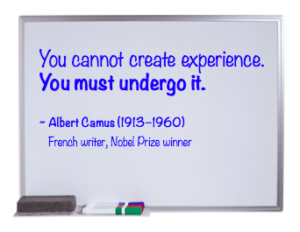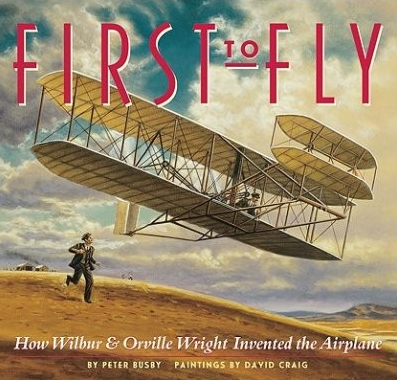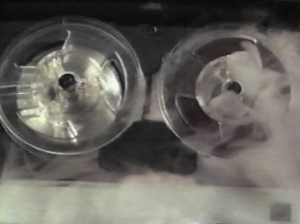business unusual in practice – part three – the passionate pursuit of experiences
I concluded my last post by explaining that ever since my first trip to Zambia, I’ve felt compelled to share my passion for doing Business Unusual – a term I learned from Mike Veitenhans, a SVP of World Vision during that first discovery trip before my church fully engaged with Moyo, our Area Development Project. Being on that trip changed my life, so saying I was “anxious” to figure out how to use that experience to make a positive impact, is an understatement.
 Without an exact plan of what it all meant/means, and with the guidance of four impressions over the preceding two years to be patient, to listen and to show up, mission work and my business have been converging in unexacting ways ever since. In fact, I give a LOT of credit to my first mission experience for changing a LOT in me both personally and professionally. Had I not pursued the possibility of going – even though it was a huge stretch to afford it both time wise and financially – I can honestly say I would no longer be in business for myself today for a whole host of reasons.
Without an exact plan of what it all meant/means, and with the guidance of four impressions over the preceding two years to be patient, to listen and to show up, mission work and my business have been converging in unexacting ways ever since. In fact, I give a LOT of credit to my first mission experience for changing a LOT in me both personally and professionally. Had I not pursued the possibility of going – even though it was a huge stretch to afford it both time wise and financially – I can honestly say I would no longer be in business for myself today for a whole host of reasons.
One of many positive outcomes was the refinement of my company’s “why” statement. As a result of my first mission experience, it more clearly evolved into, Positioning Influencers for Impact because due to my own mission work and the events that followed, I met a ton of amazingly influential people and I’ve come to the conclusion that, for the most part, everyone wants to make a positive impact during the course of their lives. I too want to use my own God given gifts. For me, that means helping fellow passionate people (the influencers) do just that. I understand the passion of wanting to affect change – to make a positive impact – to make a difference. And because of my own pursuits, I now know that what I know intuitively about how to do that, was gifted to me for that unique purpose.
Business Unusual represents the more altruistic side of the ESM Group. But whether our client is a for profit or a nonprofit, we align with influencers that make it their mission to use their influence for good.
But neither my mission experiences nor my arrival at where I am today, came easy. As I mentioned, the first trip itself was costly and the timing was totally off but despite all the reasons not to go, I figured out a way to make it possible and trusted the rest would fall into place – I went anyway and it did. Upon returning, despite what I described as a seeming willingness to go along with a slower than desired process of being patient, I was chomping at the bit. But I eventually succumbed to trusting that it would all work out and reveal itself in time somehow. I cannot begin to accurately describe how hard it was (and still is!) to keep myself reigned in and to trust that this crazy passion for mission combined with being a small business owner makes sense somehow.
So what did I learn that I can impart to encourage readers to go for it despite the challenges? That there are two kinds of passion we influencer types tend to like to engage in – Passion without a mission and passion with a mission.
I would guess about once a week I start helping a client/friend with some sales and marketing challenge and wind-up coaching them in some way about pursuing their passion. But ultimately, it comes down to this one word that a friend very directly (thankfully, because I needed to hear it that way) reminded me of a few years ago when I was writing the copy for my website – focus. A mission of any kind typically has a pretty clear focus. If you’re feeling like you’re not on a mission (in your career, in your life, etc.) that you’re passionate about, you may want to consider being a little more patient and intentional (less distracted) with the process. If you want to hear a calling or make a change, you may need to be quiet and listen for a while. Or, if you want to create something bigger than yourself, despite the disruptions, the odds against you and any excuses, you may need to truly show up.
Easy to say, not always easy to do. In today’s overstimulation thirsting culture it’s REALLY easy to get “off track” (literally, in the following example) – especially when it comes to our own agenda.
Consider the true story of Aron Ralston told through the movie, 127 Hours or the book Between a Rock and a Hard Place. The movie is a great biographical survival drama about an ultimate canyoneer, who becomes trapped by a boulder in an isolated crevice within a remote canyon in southeastern Utah. Aron was forced to amputate his own right arm in order to free himself to live. Please take a few minutes to watch the full trailer now (2:41) to get the full gist of what I’m saying. Trust me, it’s worth it – you’ll get goose bumps – Great movie!
[after he’s imagined his life (the future) with a child of his own]
Aron Ralston: You know, I’ve been thinking, everything… just comes together. It’s me. I chose this. I chose all of this. This rock… this rock has been waiting for me my entire life. It’s entire life. Ever since it was a bit of meteorite a million, billion years ago. There, in space. It’s been waiting, to come here. Right… right here. I’ve been moving towards it my whole life. The minute I was born, every breath I’ve taken, every action has been leading me to this crack on the out surface.
[after he’s cut his arm off and freed himself knowing he is going to live, he looks up to thank God]
Aron Ralston: Thank you.
The entire movie is focused on his “experience” being stuck in that canyon. It doesn’t go on to tell much about his life after that experience but do you suppose the rest of it looks a bit different than it did going into that canyon? Why? Because experiences matter.
But Aron, an over stimulated extreme sports junkie, had what is called a wake-up call. We all have those at times. Aron’s life before these 127 hours, had plenty of passion but no mission.
Sometimes we’re so busy “doing our thing” we ignore the obvious. We free thinking, uber independent, over-stimulated Americans, can’t always see the forest through the trees hence the need to be patient and to listen.
Trust me when I tell you, I had my own agenda before that whole timeline of events occurred as described in part one and part two of my previous posts. I said it before and I’ll say it again, experiences matter – they shape us. But does it have to take a mission trip to see horrific poverty/illness, a life threatening disease or being caught between a rock and a hard place to make it happen? I pray for your sake, that it doesn’t.
But on our own, it’s pretty hard to take time to hear the callings and see the connections in the crazy-busy lives in which we live. And in the case of less than positive experiences (like Aron’s) an even greater risk arises – it becomes easier to blame someone else or even God, for the circumstances we find ourselves in rather than accepting or seeing the correlation among the choices we made. To be clear, I am not judging Aron and he does NOT blame anyone for his predicament. Instead, he comes to the realization of his dire situation and his part in being there by stating rather yieldingly, “Oops.” A pivotal point in the movie.
Speaking of overstimulation, in my own multi-tasking, “shiny thing” life I lead at times, I literally just stopped writing to read a post I received in my inbox only seconds ago from Seth Godin – one of my favorite marketers. It’s on overstimulation – I am not even remotely exaggerating this “coincidence” that just occurred – hence my need to share! Seth writes…
It’s easier to tell the difference between two flashlights that are 6 lumens apart when one is just 2 lumens bright than it is to tell them apart when one is 200 lumens.
The more stimulus you’re getting (light, sound, pressure, delight, sadness) the less easily you can notice a small change. That seems obvious, but it’s worth saying.
Thanks for the stimuli to help me make my point, Seth!
As you’re probably sensing pretty loud and clear, I don’t believe experiences like I’ve had/have over the past few years happen by accident. No, I’ve been cursed with a weird, intuitive, sixth sense that sees the correlation among all things – or at least too many things at times. So I’m going to try to wrap this up with one final story before the next stimuli appears.
If Aron’s story was an example of “passion without a mission”, even though it probably lead to a huge amount of renewed passion with a mission, here’s an example of passion driven by a mission to do good.
Maybe you’ve heard Simon Sinek’s TED Talk or read his book, Start with Why. This is the read that inspired me to re-do my own positioning statement for my company as I alluded to above. It’s a GREAT leadership book about leading with your passion and beliefs.
Among many other stories, in it, Sinek talks about Orville and Wilbur Wright – a great story about triumphant, innovative, leadership against all odds due to the passionate pursuit of a belief.
He tells how every day they attempted flight they’d bring five sets of parts because they knew from experience how many times they were going to fail each day. Yes, FAIL – and not just once but FIVE TIMES a day! Seriously?!? Would you have continued never knowing when/if you were going to have a breakthrough?
Well, we know how the story ends because we’re flying in planes as if they’re cars these days but what you may not have known is that they had a formidable competitor named Langley, who was better funded, more educated, more followed by the media, etc. In fact, so much so that it seemed all Orville and Wilbur had going for them was a passion. So what did Langley do when Orville and Wilbur succeeded? Being better funded, he could have improved upon their invention getting it commercialized that much sooner – but did he do that? Nope. He quit. Why? Because his passion was not about flying – he was all about ego and being first.
Why do I tell you about this? Well, we’re talking about experiences and seeing correlations, right? In my previous post within this series, I mention how I’ve learned to be more patient, to listen more and to simply show up. So flash back to this past winter and I’m doing my typical, distracted, “pick up one book and put down another” way of reading multiple books at the same time. Just about the time I’m getting engrossed in Simon Sinek’s leadership book (mentioned above), I’m also gleaning some spiritual enrichment by reading Wild Goose Chase by Mark Batterson. Batterson’s book is about uncagging the Wild Goose (God) in your life and what the Spirit can do when/if we just set Him free to do His work without the confines of our own, over stimulated, limited in possibilities, brains, getting in the way. But get this, in his book Batterson tells a story about Orville and Wilbur too. Only he tells the story of what preceded their triumph.
On a side note, a dear friend whom I traveled with to Zambia gave me that book – and by the way, that’s a different friend than the one from the trip that introduced me to World Servants and BLI. Would I have recognized all this had I not been in the mode of being patient, listening and showing up? I think not.
 Anyway, according to Batterson, sometime in the 1870’s an annual church conference was held at Westfield College where the president of the college spoke prophetically about, “…approaching a time of great inventions” and he went on talking about “…a day when men will fly through the air like birds.” Batterson sites that a bishop who was present during the speech spoke up and accused the man of heresy saying, “The bible tells us that flight is reserved for the angels!” Then Batterson goes on to tell us that bishop’s name was Wright – father to Orville and Wilbur Wright who went on to record their first successful powered flight in 1903 – against all the odds. When your own Dad (who’s a bishop no less) doesn’t believe in what you’re doing, and you keep trying to do it anyway (5 times a day multiplied by how many days?), THAT my friends, is an example of passion with a mission.
Anyway, according to Batterson, sometime in the 1870’s an annual church conference was held at Westfield College where the president of the college spoke prophetically about, “…approaching a time of great inventions” and he went on talking about “…a day when men will fly through the air like birds.” Batterson sites that a bishop who was present during the speech spoke up and accused the man of heresy saying, “The bible tells us that flight is reserved for the angels!” Then Batterson goes on to tell us that bishop’s name was Wright – father to Orville and Wilbur Wright who went on to record their first successful powered flight in 1903 – against all the odds. When your own Dad (who’s a bishop no less) doesn’t believe in what you’re doing, and you keep trying to do it anyway (5 times a day multiplied by how many days?), THAT my friends, is an example of passion with a mission.
When I started doing “business unusual” I really didn’t know what it was going to be. I knew it had an altruistic, giving back, component but I didn’t have definition around it and I’m intentionally allowing it to remain somewhat undefined even today. Despite the way I used to need definition around all things, I’m learning to find comfort and trust in the unknown. What I do know is it’s about harnessing influence to impact the world for good and I believe somehow, in some way, it’ll make a difference. That is my dream – that is my focus – that is my passionate mission.
So, are you the type to wait until you’re between a rock and a hard place before you make a change and put some mission in your passion? If so, may I recommend going on a mission trip to get your heart broken so you can come back all fired up. Then call me when you get back!
In my first post of this series I mentioned that more than a couple years ago, when I got back from my first mission trip with my heart permanently wrecked it felt like I was “on a mission to figure out my mission from my mission trip,” which is the way this story got started.

So what’s my mission this Q4 with two upcoming mission trips in less than ideal timing? To quote one of my favorite lines from the action adventure show/movie, Mission Impossible, the self destructing tape that’s playing in my mind sounds something like this, My mission should I choose to accept it, is to let mission be a part of my own passionate mission by showing-up for missional experiences.
Could it have BEEN more obvious? Hah! Stay tuned.
Elizabeth Mansfield
Founder and Principal Influencer
Strengths Finder 2.0: Woo } Activator } Strategic } Ideation } Communication




